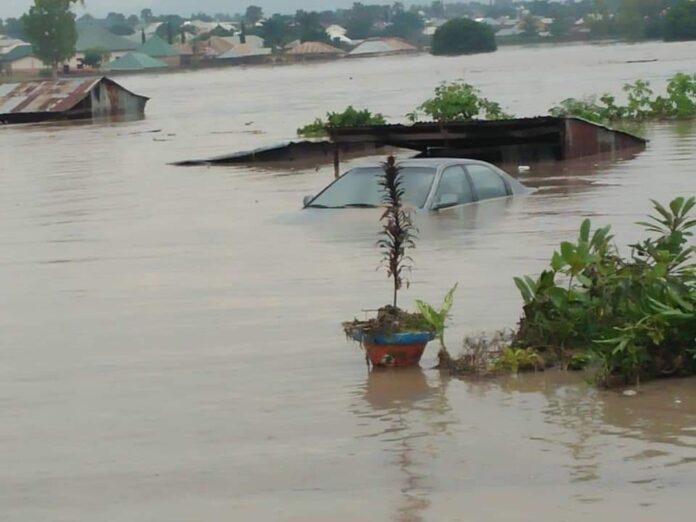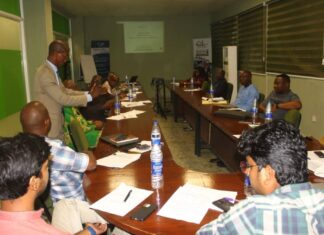Flood wrecks N700b agricultural investment, displaces 1.4m people
By Jeph Ajobaju, Chief Copy Editor
About N700 billion worth of investment in agriculture was destroyed by the mass flooding in 2022 which wrecked farmlands and crops, damaged homes and roads, displaced over 1.4 million people, and killed more than 600.
A new report by the National Agricultural Extension and Research Liaison Services (NAERLS) shows the flood was caused by a burst dam, overflowing rivers, heavy rain, and blocked drainages, among other factors.
NAERLS Executive Director Emmanuel Ikani, a Professor, disclosed at the presentation of the report in Abuja the floods damaged crops and destroyed agricultural land, leading to reduced yields and economic losses for farmers.
He estimated there are over 3,000 gully erosion sites in the 10 most-affected states in the South East, South South, and South West.
“Soil water also contaminated the soils and makes them less fertile, leading to longer-term impacts on crop and animal production. The economic value of the agricultural-related losses due to the 2022 flood was estimated to be about N700 billion.
“The 2022 flooding situation damaged roads, bridges, and other transport networks, making it difficult for people to travel and for agricultural goods to be transported. The flood also damaged agricultural stores and warehouses,” Ikani said.
“The flood had serious consequences for human populations, including loss of life, injury, and displacement. It led to the spread of waterborne diseases and disrupted access to clean water and other necessities.
“As of September 14, 2022, many communities in Borno, Adamawa, and Yobe States regions had reported cholera outbreaks, with 586,110 and 320 cases, respectively, and nearly 300 have died.”
Communities and governments need to work together to implement measures to reduce the risk of flooding and its impact, Ikani counselled.
He explained the main cause of flood in the South South, South East and North-Central was the release of water from Lagdo dam in Cameroon which flowed into some major rivers and caused overflow.
He added the North West and North East were flooded due to heavy rainfall and blockage of drainages, and rainfall caused the same effect in the South West.
“Kebbi, Delta, and Cross River States with calculated index values of 0.3500, 0.2951 and 0.2218, respectively were the most severely affected by the 2022 flood while Nasarawa, FCT and Oyo with 0.0515, 0.0243 and 0.0079, respectively were the least affected.”
___________________________________________________________________
Related articles:
UNICEF donates N230.7m relief materials to Jigawa flood victims
IMF warns of flood worsening food insecurity, stoking food prices
__________________________________________________________________
Flood affect 1,798 communities in 23 states
Ikani confirmed 1,798 communities were affected in 263 councils which prompted humanitarian interventions mostly shared after the occurrence of flood by 23 states while farmers in seven states did not receive any palliative during and after the flood.
He said the flood caused mainly by heavy precipitation, ill-managed run-offs, and unregulated river flow, especially from River Benue, per reporting by Tribune.
“The assessment showed that the 2022 flooding damaged crops, washed farmlands and destroyed livestock and fish resources. The enormous flood is a potential threat to food security.”
His recommendations include:
“Dry season production of staple crops should be promoted across the country in both formal and informal irrigation schemes to bridge the imminent food supply gap.
“Irrigation facilities such as tube wells, hand pumps and early maturing seed varieties should be provided to farmers.
“NAERLS in collaboration with state ADPs, FDAE, FDA should be funded to provide technical support to the farmers.
“The Federal Ministry of Water Resources should consider building at least one dam on the Benue River for flow regulation. The long-proposed Dasin Hausa Dam in Fufore LGA of Adamawa State will serve as a buffer for the excess flow from Ladgo dam in Cameroon.
“River Basin Development Authorities should be mobilised and facilitated to undertake river training and desilting of major rivers within their catchment, improve the integrity of the banks and streamline the courses for improved handling capacities and freer flows.
“Promotion of climate-smart agricultural practices through upgrading Flood Early Warning Systems (FEWS), sensitisation and education of farmers.
“NiMET, NIHSA should be supported for improved data collection and analysis while NAERLS, FDAE and FDA be funded for sensitisation and dissemination of flood early warning systems.
“National Agricultural Research Institutes should be charged and supported to breed and promote climate resilient (drought-tolerant, flood-resistant, and early maturing) crop varieties.
“Improving run-off management through the provision of erosion control measures in towns and villages and construction of underground water harvesting reservoirs within the catchment of rivers and large streams.”
Agriculture and Rural Development Minister Mohammad Abubakar sought collective efforts to educate Nigerians on how to mitigate the effects of flooding.













